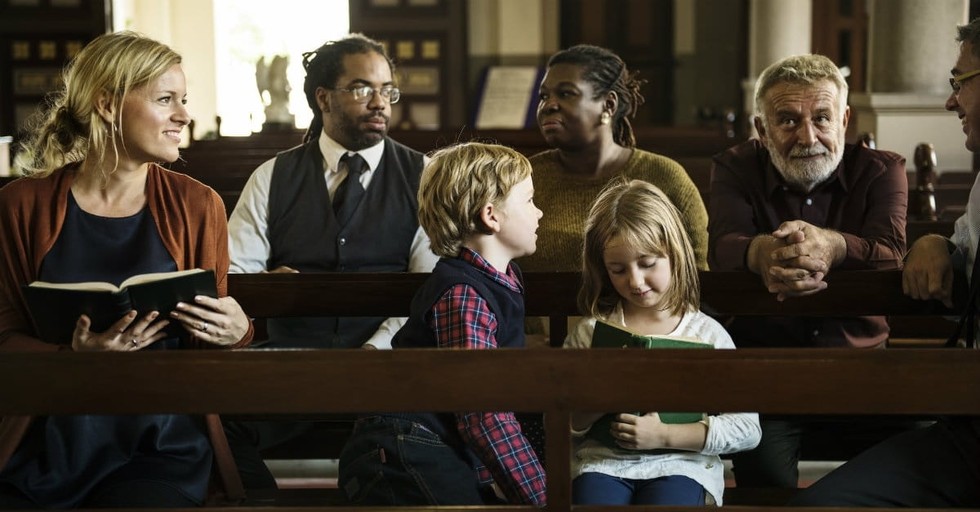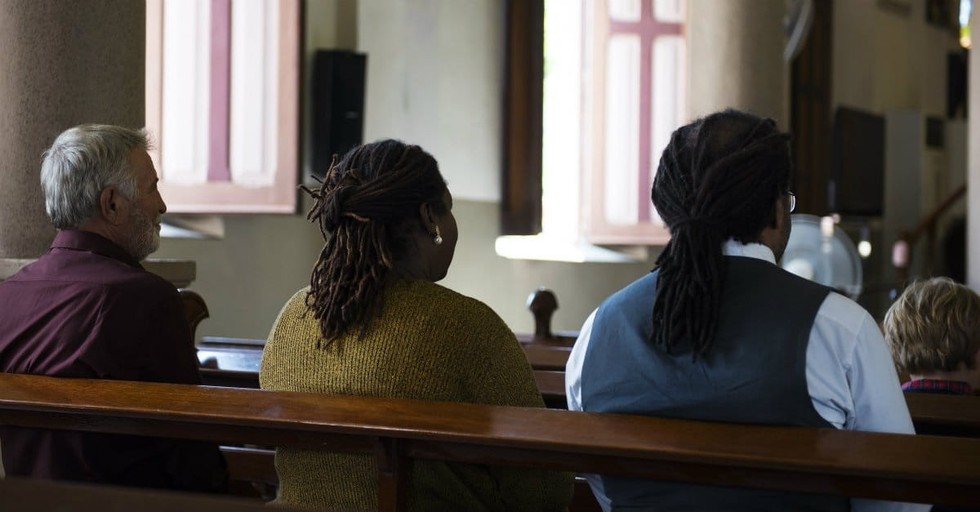10 Things in Your Church That Alienate Introverts
- Janna Wright Crosswalk.com Contributing Writer
- Updated Aug 08, 2023

It was my first time in this particular setting. I sat through the worship and teaching times, quietly getting a sense of the group and how things worked.
I was enjoying myself well–until the sharing time began. Each person in the room began to share personal struggles. As I watched it became obvious that everyone was expected to participate. Now I love the idea of honest vulnerability, but as the leader prodded me not once, but twice, to share something personal with people I’d never met, I became uncomfortably aware that this didn’t feel like a very safe place.
If you’re an introvert like me, you understand my hesitance. Many social and church situations are designed with extroverts in mind—situations that can leave the other 50% of society feeling uncomfortable. Here are 10 church things that can alienate introverts.
Janna Wright told her first story—something about kittens and lost mittens—at age two. As an author and speaker she still loves sharing stories, especially through her “biz-nistry,” Grace Thread, and her recent book, Grace Changes Everything. Janna adores deep talks, the Colorado mountain air outside her back door, and most of all, helping women of faith thrive in their God-given adventure stories.
Image courtesy: ©Thinkstock/Rawpixel
-
![1. Prolonged Welcome Time]()
1. Prolonged Welcome Time
Slide 1 of 10Number one on the list of scare-away-the-introverts is a long hand-shaking time during the church service. Most introverts don’t mind shaking hands for a little while. But introverts don’t usually enjoy a lot of small talk. And after greeting people nearby, long welcome times leave the introvert standing awkwardly, feeling like an outcast, or putting on a fake face and shaking hands anyway.
None of these solutions are happy ones. Be aware that prolonged welcome time will probably send most introverts running for the hills (or at least the coffee bar or bathroom).
Image courtesy: ©Thinkstock
-
![2. Overly Enthusiastic Greeters]()
2. Overly Enthusiastic Greeters
Slide 2 of 10Happily, most churches understand the importance of greeters. After all the main church doors are an ideal place to welcome new and returning people! But a boisterous greeter can scare off incoming introverts, especially if the greeter is too enthusiastic, especially loud, or peppers people with questions.
Introverts like conversations with people they know and trust. And too much enthusiasm (or a barrage of questions) while the introvert’s trying to navigate inside and find a seat just makes him uncomfortable.
Image courtesy: ©Thinkstock/kk5hy -
![3. Expectations (or Pressure) to Serve]()
3. Expectations (or Pressure) to Serve
Slide 3 of 10Introverts truly love other people. And introverts especially love serving people within their own skill set, according to their time frame, and in a way that honors who the introvert is.
A church with a myriad of programs and ministries can overwhelm introverts, especially if those opportunities include pressure and expectations to serve a certain way. Introverts like to be approached about an opportunity and given time to think through and process what they desire to do. When they’re given appropriate time and space to process what they need, introverts can become some of the most loyal volunteers a church can have.
Image courtesy: ©Thinkstock/digitalskillet -
![4. Misjudged Silence]()
4. Misjudged Silence
Slide 4 of 10Think back to a recent life group or Bible study meeting. There were probably a few talkers and some definite listeners in the room. Chances are the listeners were introverts.
In a group setting introverts often sit quietly before jumping into the conversation. It doesn’t mean they’re upset, shy, snobby, or daydreaming. And it definitely doesn’t mean there’s nothing deep going on inside. (On the contrary introverts have hundreds of deep thoughts!) Most introverts prefer to take their time to fully understand an atmosphere, situation, or group dynamic before contributing.
Image courtesy: ©Thinkstock/g-stockstudio -
![5. Asking Guests to Stand and Introduce Themselves]()
5. Asking Guests to Stand and Introduce Themselves
Slide 5 of 10Another guaranteed way to make introverts want to crawl under the nearest pew is to ask them to stand up in front of an entire church and introduce themselves out loud. It’s not that all introverts are shy, reclusive, or have irrational fears around public speaking. It’s just that most don’t enjoy being surprised with having to speak to a large group they don’t know.
Churches can help their introverted visitors by giving them opportunities to seek out church information one-on-one in the lobby. Or by having a few select, trained members welcome visitors privately.
Image courtesy: ©Thinkstock/Hramovnick -
![6. Being Singled Out]()
6. Being Singled Out
Slide 6 of 10We’ve probably all been there. The leader in front of the room is passionate about his latest ministry project, and he needs volunteers. So he looks around, picks a face he knows, and asks that person to commit on the spot.
This whole scenario makes introverts cringe. Really most people hate being put on the spot, but introverts especially – whether it’s to share something, to volunteer, to stand up, to give an update, to do, well . . . anything unexpected. Better to wait for the enthusiastic volunteer than to single anyone out (especially an introvert).
Image courtesy: ©Unsplash/Photo by Michelle Jimenez -
![7. Sharing Personal Things with Strangers]()
7. Sharing Personal Things with Strangers
Slide 7 of 10Like my experience with the church group pressuring people to share struggles, it can be tricky for introverts to open up to strangers. In a church setting when there’s a chance to offer prayer requests or discuss personal issues, most introverts won’t be the first (or second or third) to volunteer. When thrust into a you-should-share situation, many introverts will opt out. And that’s okay.
Forcing people to reveal personal things is seldom the best way to cultivate a grace-filled environment anyway. And introvert or not, people appreciate being welcomed into a safe sharing space and invited to participate when they’re comfortable and ready.
Image courtesy: Thinkstock/Rawpixel -
![8. Uncomfortable Prayer Time]()
8. Uncomfortable Prayer Time
Slide 8 of 10Have you ever noticed what an intimate thing prayer is? Prayer is basically having a chat with omnipotent God and is often quite personal, when we stop and think about it.
Not everyone is comfortable praying while others listen, and introverts can fall into this category. Being asked to lead corporate prayer can be nerve-racking for them. And popcorn prayer (pray-as-you feel-led-but-everyone’s-actually-expected-to-participate) is also hard for introverts because it feels like pressure.
Just because someone prefers to pray silently doesn’t mean they’re not close to God or that there’s something wrong. God created various personality types, and leaving room in church situations for different preferences and communication styles is healthy.
Image courtesy: ©Thinkstock/shironosov -
![9. Prolonged Physical Contact]()
9. Prolonged Physical Contact
Slide 9 of 10Whether it’s holding hands with the strangers across the aisle to create that unbreakable chain, bombastic hugs from enthusiastic greeters, or extended hand shaking, prolonged physical contact can make introverts cranky.
There’s just something about being that close to acquaintances (or complete strangers) that makes the introverts among us dash for the nearest exit. Making personal contact optional in large church settings will help your introverts feel more at home.
Image courtesy: ©Thinkstock/ThomasNorthcut -
![10. Activities Tailored for Extroverts]()
10. Activities Tailored for Extroverts
Slide 10 of 10Church activities are typically geared for medium to large groups: Bible studies, retreats, conferences, social gatherings. And with an increase in crowd size comes an increase in the energy it takes for an introvert to stay tuned in and comfortable.
Introverts typically enjoy socializing and talking with a few people at a time, so if an event has too many people, requires too much extroverting, or even just lasts too long, introverts will probably look for the nearest escape route.
As believers it’s important to remember we’re all part of the same body but with different gifts and functions. If we commit to being “kindly affectioned one to another with brotherly love; in honour preferring one another” (Romans 12:10 KJV), we’ll realize that loving our brothers and sisters in Christ means accepting and appreciating them for who they are—introvert, extrovert, and all.
To read the text-only version of this article please click here.
Image courtesy: ©Unsplash/ChadKirchoff



 Previous
Previous








